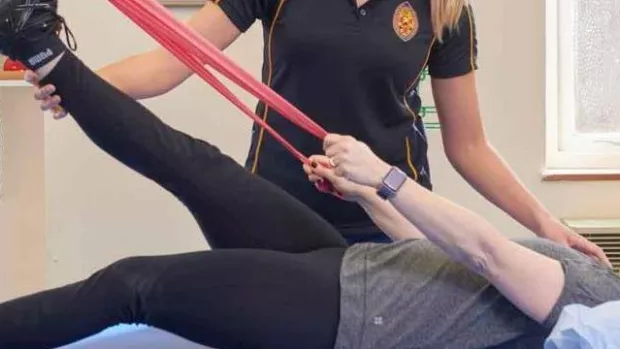
MS tremors
Tremors can be a symptom of MS - a trembling or shaking movement you can’t control. This could appear as shaking hands, or tremors in other parts of the body. Some kinds of MS tremors can be called ‘ataxia’.
Tremors can be a symptom of MS - a trembling or shaking movement you can’t control. This could appear as shaking hands, or tremors in other parts of the body. Some kinds of MS tremors can be called ‘ataxia’.
Like other MS symptoms tremors can come and go, or they could be longer lasting. Tremors in MS might be hardly noticeable to others, or they could be more severe. There are ways you can treat and manage MS tremors.
How do tremors affect people with MS?
For some people with MS, tremors are so mild that no one else notices. For others, the tremor might be more pronounced. For example, it might cause a drink to spill when you lift a full cup. For a small percentage of people MS tremors are more severe, causing limbs to shake so that you need help with everyday tasks.
If your tremor is severe, it could have a significant impact on your independence. It can also directly affect your general wellbeing, work and social life. You might feel embarrassed about your tremor. You might avoid situations which make you feel self-conscious about it. Or it might make you feel anxious, and in turn that anxiety may make your tremor worse.
Whatever you feel – and it may be different at different times – you don’t have to cope alone. We can support you if you've got worries and questions. Our MS Helpline gives emotional support and information to anyone living with MS.
Tremor can be one of the more difficult symptoms of MS to manage, but there are things that can make a difference, including:
- physiotherapy
- occupational therapy
- drug treatments
- surgery
Read about treating and managing tremor
Gross tremor and fine tremor
Tremors in MS can be either big movements, called ‘gross tremor’, or small movements, called ‘fine tremor’.
Everyone has some amount of fine tremor – known as ‘essential tremor’. It’s when our hands shake a tiny bit, especially if we’ve drunk coffee or there’s a lot of adrenaline in our system after a shock or excitement.
Fine tremor in MS can be a more noticeable version of that. It might be a shaking in the hands, feet or other part of the body.
If you have the bigger movements of gross tremor, that might be in the arms or legs. This can make it harder to balance or perform certain active movements, like reaching for something.
How common are tremors in MS?
It’s not clear exactly how many people with MS are affected by tremor, but research suggests it’s between 25 and 60 per cent.
What kinds of tremors are most common in MS?
There are two kinds of tremors that are most common as a result of MS:
- intention tremor
- postural tremor
So as well as describing tremors as 'fine' or 'gross' (small or big), we can also use 'intention' and 'postural' to describe when tremors happen.
Intention tremor
Intention tremor is the most common MS tremor. It comes on when you want to do something or reach for something. It often gets worse the closer you get to the object. If you have intention tremor because of your MS, you’ll probably find that while your muscles are completely relaxed – such as when you are lying down or asleep – your tremor goes away.
Postural tremor
Postural tremor is when you shake when you’re sitting or standing. It comes on while your muscles are trying to hold part of your body still against the forces of gravity. Like with intention tremor, postural tremor usually goes away if your muscles are completely supported or relaxed, for example if you’re lying down or sleeping.
Read more detail about different types of tremor from the National Tremor Foundation
Ataxia and tremor in MS
You might come across the word ‘ataxia’ used instead of, or as well as, tremor. Ataxia is when muscles aren’t coordinated. It can lead to different MS symptoms including problems with balance, coordination and sometimes tremor.
Some of the ways to treat and manage tremor can also help with ataxia's effects on balance and coordination. For example, strengthening core muscles can help with posture.
Last full review: 27 February 2023 | Next review: 27 February 2026
We also update when we know about important changes.




